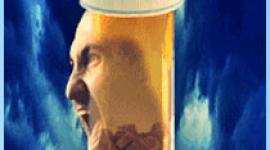Mood Disorders as Physical Illnesses
A Primer on Depression and Bipolar Disorder
II. MOOD DISORDERS AS PHYSICAL ILLNESSES
In this essay we will explore the nature of depression and bipolar disorder as physical illnesses of an organ of the body, known as the brain, which manifest themselves through mental symptoms (see definition on p. 8) in the magnificently complex set of internal experiences we call our mind. I will touch briefly on causes, symptoms, treatment, suicide, impact on family and friends; my focus will be primarily on understanding these aspects of the problem. In addition, I will touch on the issues of self-help and support groups, stigma, public policy, and hope for the future. But the reader must be aware that what I write here is unabashedly devoted to the treatment of the physical aspects of depression and bipolar disorder. The process of healing one's psyche (i.e. one's internal feelings about oneself and the world) after successful medication moves the brain's physiology into the normal range is barely mentioned; it is discussed in my companion essay "Depression and Spiritual Growth" (see Bibliography). Both aspects of the recovery/rebuilding process are critical for sustained growth and wellness of victims of these illnesses.
A. Causes
 The ultimate causes of depression and bipolar disorder are not yet known. But over the years a number of hypotheses, theories, or ``models'' have been advanced as possible explanations of these illnesses; some of them have proven to be much more useful in treating the illnesses than others. Some of the earliest work was done by Sigmund Freud, who tried to fit the mood disorders into the framework of ``psychoanalysis'', the talk-therapy technique he invented to treat mental illness. He had some success treating some patients with mild to moderate depression, less success with people who were severely depressed, and essentially no success with people who suffered from bipolar disorder. The latter illness he called a ``psychosis'', i.e. a very severe, and possibly permanent, mental disorder in his scheme of things. The fact that Freud, one of the most brilliant, creative, and insightful of the talk-therapists of all time, got such poor results treating the severe mood disorders is very significant. It is strong evidence that he was using the wrong therapeutic approach; that these illnesses in their most severe forms don't respond to manipulation of our thoughts, but require more direct medical intervention.
The ultimate causes of depression and bipolar disorder are not yet known. But over the years a number of hypotheses, theories, or ``models'' have been advanced as possible explanations of these illnesses; some of them have proven to be much more useful in treating the illnesses than others. Some of the earliest work was done by Sigmund Freud, who tried to fit the mood disorders into the framework of ``psychoanalysis'', the talk-therapy technique he invented to treat mental illness. He had some success treating some patients with mild to moderate depression, less success with people who were severely depressed, and essentially no success with people who suffered from bipolar disorder. The latter illness he called a ``psychosis'', i.e. a very severe, and possibly permanent, mental disorder in his scheme of things. The fact that Freud, one of the most brilliant, creative, and insightful of the talk-therapists of all time, got such poor results treating the severe mood disorders is very significant. It is strong evidence that he was using the wrong therapeutic approach; that these illnesses in their most severe forms don't respond to manipulation of our thoughts, but require more direct medical intervention.
Freud's picture of the causes of the mood disorders is quite fanciful and misleading in the light of modern knowledge. But his pioneering methods were essentially the only therapeutic procedures available until the development of useful psychiatric medications starting in the 1950's and onward. Since that time there has been a rapid increase in the number of medications that can be used to treat depression and bipolar disorder effectively. Today, therapy using these medications has largely displaced psychoanalysis for the severe mood disorders. Even though methods based on a psychopharmacological model are often preferred today, results are usually obtained if treatment with medication is combined with one of the modern forms of talk-therapy (usually quite different from Freudian psychoanalysis). Once medication permits the brain to function again within the normal range, it is necessary for almost all victims to go through a carefully-guided, and extensive, period of healing and rebuilding. The fruits of these efforts are frequently stupendous; the victim finds him/herself feeling well, sometimes for the very first time in their lives!
Our basic picture of brain function today is that cognition, memory, and our moods all result from constant passing back and forth of electrical impulses through the extremely complex network of nerve cells that permeates the brain. There is a large body of convincing experimental evidence that this picture is correct, and recently a great deal of theoretical work has allowed researchers to begin to simulate the behavior of this network with computers. If the message-passing process, neurotransmission, is broken, interrupted, diverted to the wrong place, then the transmission of information from one point in the brain to another where it is needed, fails.
In some cases this loss may be inconsequential; in others it may cause a massive failure of the system: loss of memory, misinterpretation of reality or inability to perceive reality, or inappropriate mood. The crucial nexus in the message passing process occurs in a small gap, the synapse, between the extremities of nerve cells, which do not quite touch. The ``firing'' of one cell excites a complex biochemical and biophysical reaction in the synapse, and chemical messengers flood across the synapse from the exciting cell to the receiving cell. The receiving cell, in turn, passes the message on by initiating the same process at the next synapse. If anything goes wrong with this mechanism, if a nerve doesn't fire, if the chemical soup in the synapse is not exactly right, if the receiving cell doesn't respond correctly to the chemical messengers, then message transmission is disrupted. Depending on where and how the interruption occurs, we will experience one or more incorrect psychic phenomena in our minds; if the errors become large, we experience mental illness. In summary, in this model, we say that one suffers from ``mental illness'' when a definite set of physical/chemical disorders in the physical organ we call the brain causes us to experience abnormal and undesirable behavior of the complex phenomenon (which includes awareness, mood, abstract reasoning, thinking, ...) which we call our mind.
The appropriateness of the title of this section now becomes apparent, and we shall henceforth adopt the model that major mental illness results from one or more serious defects in the neurotransmission process (and perhaps other brain processes as well, not yet fully understood). Indeed, in the case of schizophrenia and the major dementias (e.g. Alzheimer's) there is a great deal of evidence that over a period of time the brain suffers severe damage and/or deterioration internally, again the result of (unknown) physical mechanisms. In other words, we will view the mentally ill brain as being, in a sense, ``broken''. And the job of the physician and patient is to repair or overcome, if possible, the damage.
At the present time this is best done using specific medications, which have been carefully tested and validated, to relieve the symptoms of the various mental illnesses. The ultimate cause of these failures of brain function is not yet known. Some research strongly indicates that the problem is genetic; that it is programmed into the DNA of our bodies at birth, an unfortunate inheritance from our parents. That, if true, has a sinister ring because it means some of us are ``doomed'' to the disease no matter who we are, or what we do. On the other hand it would also mean that at some point in the future in may be possible to eliminate the problem at or before birth, using rapidly progressing recombinant DNA techniques. Or it may be that the brain can be damaged by physical or chemical influences from its environment. The jury is still out on these questions.
One important conclusion to be drawn on the basis of the biological model of mental illness described above is that mental illness is not the result of a failure of will, or of the desire to be well. Countless mentally ill people have had to suffer both the ravages of the disease, and the scorn of an uncomprehending society, a doubly cruel injury. One of my strongest hopes for the future is that all people who have CMI, and society at large, can learn that mental illness is illness in the ordinary medical sense, and deserves to be treated with as much respect and compassion as any other illness. Indeed, a workable metaphor for bipolar disorder is that in many ways it is a condition something like diabetes. That is, the illness can cause major disability, or even death (through suicide), and it may well be permanent in many cases. But at the same time, it responds well to medication, and if the victim takes his/her medication faithfully, he/she can lead an essentially normal life. I have known several courageous diabetics who manage to lead productive and satisfying lives; and I know an increasing number of courageous people who have CMI who do so also.
Up to this point I have focused almost exclusively on chronic, often severe, depression, resulting from fundamentally biological causes. But all of us are all too familiar with another kind of depression. To illustrate, suppose you struggle through traffic one morning, and have a minor accident which does several hundred dollars of damage to your car; you arrive at work, and your boss throws a fit because you are late (again!) and fires you on the spot; you go back home, and on the kitchen table find a brief note from your spouse saying that he/she is leaving you, and has run off with the next door neighbor. Unless you are very unusual, by this time you will be depressed. The depression may be fairly severe, and it may last for a substantial time: days, perhaps even weeks. But in the end, this kind of depression will usually lift by itself, and will normally respond very well to talk therapy and/or medication. Three characteristics of this kind of depression are that: (1) it is caused by events outside of you, i.e. that it is a (reasonable!) response to unfavorable conditions in your reality; (2) it is the result of a loss, or the perception of loss (if no loss actually occurred); and (3) it is temporary (imagine a reversal of the causative events, or the interjection of a new positive event -- say winning the jackpot in the lottery). I will refer to this type of depression as "psychogenic'' to reflect the fact that its origins result from psychic activity in our brains stimulated by outside events. I am sure that doctors would object to such a term (their term "exogenous'' is, if anything, worse), but I will use it anyway as a metaphor to suggest the characteristic depressive response to unfavorable outside events.
In contrast, I will refer to the kind of depression I have been talking about earlier (plus bipolar disorder) as "biogenic'' to stress that it is a result of biological/biochemical/biophysical malfunction in our brains, independent (almost) of outside events. (Doctors would probably prefer the word "endogenous'', but I'm not a doctor so I'm exempt.) A characteristic of this kind of depression is that it is usually chronic: it has existed for months or years (in some cases a lifetime), and can exist for an arbitrarily long time into the future, regardless of outside events. Of course, it is almost never ``either-or''. In most serious depressions both causes can be implicated. Typically a psychogenic event will trigger a much more serious biogenic response in the brain. A good example is my move to Illinois in 1985; the combination of loss of friends and familiar environs, plus the stresses associated with a new job and making new friends, provided a trigger to drop me into the major depression that had been lurking about, waiting for me to fall in, for years. To make an analogy: when you get to the edge of a cliff, and then suddenly slip on a marble and fall over the edge, the marble was only the trigger for the disaster; it is the depth of the fall from the top of the cliff to its bottom that does you in.
In the name ``bipolar disorder'' also known as bipolar affective disorder, ``bipolar'' means that the victim can swing ``up'' and ``down'' between mania and depression; ``affective disorder'' means mood disorder. Depression is now often called unipolar mood disorder or unipolar depression, which means the victim goes only from normal moods to depression, goes only ``down''. The ``bipolar'' and ``unipolar'' designations have the advantage of being linguistically neutral, emphasizing the fact that the victim has a ``disorder'', i.e. illness, rather than that he/she is ``manic'' and/or ``depressed''. This is a fine linguistic point perhaps, but an important one, especially when most people in society don't distinguish between the words ``manic'' and ``maniac''. In any event, remember that all these terms are only metaphors (as are all the terms of medical science); use them when they are useful, but don't feel bound to them in the face of a more complex reality.
next: Treatment of Depression and Bipolar Disorder
~ back to Manic Depression Primer homepage
~ bipolar disorder library
~ all bipolar disorder articles
APA Reference
Staff, H.
(2008, December 26). Mood Disorders as Physical Illnesses, HealthyPlace. Retrieved
on 2025, December 18 from https://www.healthyplace.com/bipolar-disorder/articles/causes-of-bipolar-disorder



